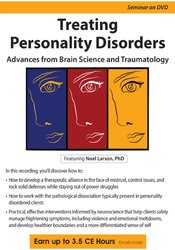

Clients with personality disorders—narcissistic, borderline, antisocial, sociopathic—often have profound traumatic childhoods, which leave them without a solid inner core from which to function. Often “nudged” into treatment by others, including the law, their inability to trust and their need for power make forming a therapeutic alliance seemingly impossible. They come armed with defenses developed at very early ages that are designed to ensure their survival by protecting their fragility. In this workshop, you’ll explore:
| File type | File name | Number of pages | |
|---|---|---|---|
| Slides - Treating Personality Disorders (1.54 MB) | 44 Pages | Available after Purchase | |
| Slides - Treating Personality Disorders - French (1.54 MB) | 44 Pages | Available after Purchase | |
| Slides - Treating Personality Disorders - Italian (1.54 MB) | 44 Pages | Available after Purchase | |
| Slides - Treating Personality Disorders - German (1.54 MB) | 44 Pages | Available after Purchase | |
| Slides - Treating Personality Disorders - Spanish (1.54 MB) | 44 Pages | Available after Purchase |
Noel R. Larson, PhD, MSW, is a licensed psychologist, marriage and family therapist and independent clinical social worker. She maintains a private practice at Meta Resources, a clinic she co-founded with James Maddock in 1981. Dr. Larson also provides supervision and consultation to groups throughout the country and conducts training workshops in the U.S. and abroad on personality disorders, family therapy, resilience, sexual abuse treatment, systemic treatment of domestic violence, group therapy, trauma and attachment and the therapist differentiation.
Dr. Larson provides ongoing consultation with several health care, social service and corrections organizations in Minnesota and Colorado and has had an ongoing consultation and training practice in Denmark for thirty years. Noel taught for several years at the University of Minnesota Graduate School of Social Work before becoming director of the Family Sexual Abuse Treatment Program at the University of Minnesota Medical School. She also developed and implemented the first U.S. treatment program for incarcerated female sex offenders at the Shakopee women's prison.
Dr. Larson is the coauthor of Incestuous Families: An Ecological Approach to Understanding and Treatment (Norton). As a consultant to a domestic violence treatment program, her and Dr. Maddock's systemic model was featured on Oprah, as an alternative to the cognitive-behavioral anger-management model.
Speaker Disclosures:
Financial: Noel Larson receives a speaking honorarium from PESI, Inc. She has no relevant financial relationships with ineligible organizations.
Non-financial: Noel Larson has no relevant non-financial relationship to disclose.
Risk factors, therapeutic options
Cluster characteristics
Developmental characteristics
Differential diagnostic criteria and defining characteristics
Pathological v. healthy narcissism
Differential diagnostic criteria and defining characteristics
Boundary setting and treatment approaches
Attachment and therapeutic relationship considerations
Differential diagnostic criteria and defining characteristics
Victim v. perpetrator symptom expression
Complex therapeutic history
Common underpinnings to varied personality diagnoses
Relationship characteristics
Family systems
Neurophysiological systems
Determining level of intervention
Self-regulation, positive regard, mirroring
Creating attachment and inserting self into therapy
Importance of non-verbal communication
Language selection and techniques
Please wait ...